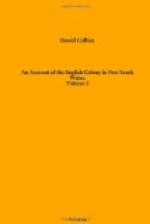At this time, when the certificates were granted, a numerous body of the Irish convicts, many of whom had but lately arrived, insisted that ’their times were out,’ and could not be persuaded that they were mistaken by any remonstrance or argument. They grew noisy and insolent, and even made use of threats; upon which a few of the most forward and daring were secured, and instantly punished; after which they were ordered to go peaceably back to their work. They had also taken up the idea that Ireland had shaken off its connection with England, and that they were no longer to be considered as convicts under the British government. This was a most pernicious idea to be entertained by such a lawless set of people, and required the strong arm of government to eradicate it.
Agricultural concerns at this time wore a most unpromising appearance. The wheat proved little better than straw or chaff, and the maize was burnt up in the ground for want of rain. From the establishment of the settlement, so much continued drought and suffocating heat had not been experienced. The country was now in flames; the wind northerly and parching; and some showers of rain, which fell on the 7th, were of no advantage, being immediately taken up again by the excessive heat of the sun.
On the 12th, the Norfolk sloop arrived, with Lieutenant Flinders and Mr. Bass, from the examination of Van Diemen’s land.
As the result of this little voyage was the complete knowledge of the existence of a strait separating Van Diemen’s land from the continent of New Holland, it may not be improper to enter with some degree of minuteness into the particulars of it; and the writer of these pages feels much gratification in being enabled to do this, from the accurate and pleasing journal of Mr. Bass, with the perusal and use of which he has been favoured.




